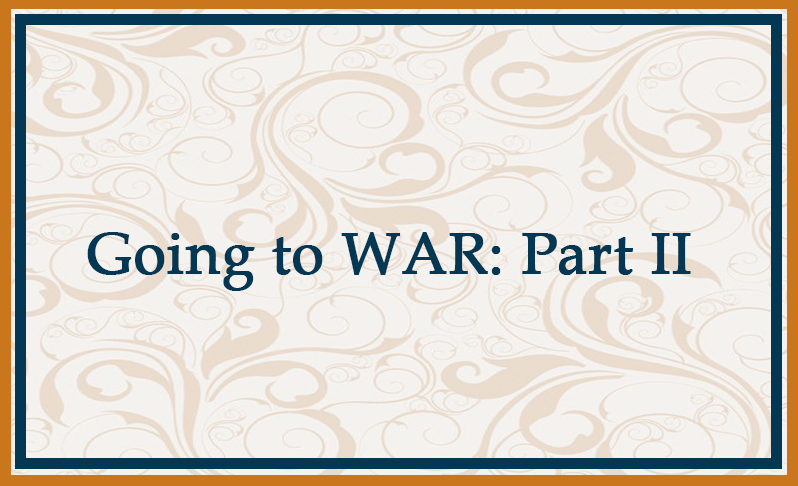As we explained in our previous post, the Weekly Assessment Report—the WAR—provides an excellent methodology for assessment. Unlike annual reports, the WAR provides a weekly snapshot of the activities that dominate our CTL’s schedule as well as an easy way to check on items that are registering less frequently. As a result, we can respond to challenges and opportunities immediately rather than being months late.
How Weekly Assessment Reports Work
Here’s how the WAR works. Each Friday morning we type up a report by starting with the basic shell of our strategic plan. For instance, under Goal 3, Objective 1 states, “The TLC [The Teaching & Learning Center] will provide faculty and staff with cutting-edge pedagogy information/training.” The objective specifies a couple of aims. One, we are not going to go back and rehearse materials that have become commonplace. The faculty handbook places responsibility on individual faculty for staying current; our job is to help there, while faculty will have to learn the foundational material (e.g., what are Boyer’s four areas of scholarship) on their own. Secondly, the inclusion of the “staff” suggests why we often use the more inclusive term “professional” (e.g., Profession Learning Community). No, we do not use staff because we offer pure staff training in such things as proper use of chemicals, but because at our university the administrative staff (e.g., the Provost, deans, academic vice-presidents, director of Public Relations) actually teach everything from first-year to graduate courses.
At one time we were fulfilling Goal 3, Objective I through a series of what we called roundtables. When we were asked by our then dean to offer not only pedagogical training but in the fall to offer the roundtables as a way of various groups, especially those in our college (University Programs), to be able to present to the faculty at large what services they render, we envisioned these roundtables as active-learning workshops. Thus, back then, our WAR would mention talks by the University Co-op Education area, Study Abroad, University Counselling, and the disabilities office interspersed with workshops on flipping the classroom and SOTL. What we came to realize was that by spreading out the presenters’ areas, we had lost a sharp focus on our main mission (Helping Teachers Help Students Learn Deeply).
Therefore, this semester we inaugurated the Teaching and Learning Innovation Series (TLI) to refocus on the objective’s “cutting-edge” pedagogy. Instead of 20 presentations that ricocheted between service and pedagogy, we emphasized such obviously teaching concerns as critical reading, metacognition, intuitive teaching, quality matters, and designing visual syllabi. We also cut the number in half, figuring that offering half the number might increase attendance.
We made other subtle changes after looking through last semester’s WARs. We noticed that we had set up workshops on all five days, so any faculty member looking for continuity would be unable to find it. Therefore, this year we scheduled every event on Thursday afternoon. The registrar informed us that Friday classes were being scheduled less and less, and the most open times (i.e., fewest classes) were 8:00 a.m. and 3:30 p.m., so we chose 3:00-4:00. And to give us a better sense of who was attending, when we put out announcements of our events, we listed a registration URL. Furthermore, we created a logo for the TLI series, and after each event we emailed its participants a simple electronic evaluation. Finally, we created flyers, electronic and paper, for each presentation, handing out the flyer for event 4 at event 3 and including the flyers as attachments when we used the campus email system to advertise our series. Rusty, our master tweeter, took to Twitter to advertise and provide real-time updates of our programming.
The Weekly Assessment Report Results
Already this semester, attendance at our sessions has increased. Our workshop on metacognitive strategies, for instance, received over 50 registrants, so we had to move it twice to larger rooms that could accommodate such a crowd. In fact, that workshop proved so successful that we added a second session on metacognitive strategies for later in the semester. Another improvement has been an increase in email traffic. This morning, for example, we found an email from a metacognition participant with a source he “hoped” we mentioned at our next session.
And all this change came about in just one goal’s one objective. From the beginning we’ve said that so much of what we do at our CTL is in its beta stage. The WAR has provided us with an instrument to make informed changes on the fly.
Author
 Ph.D Hal Blythe writes literary criticism to mystery stories. In addition to the eleven books he’s published with New Forums, Hal has collaborated on four books on a variety of subjects, over 1000 pieces of fiction/nonfiction, and a host of television scripts and interactive mysteries performed by their repertory company. He is currently co-director of the Teaching and Learning Center for Eastern Kentucky University. Meet Hal Blythe.
Ph.D Hal Blythe writes literary criticism to mystery stories. In addition to the eleven books he’s published with New Forums, Hal has collaborated on four books on a variety of subjects, over 1000 pieces of fiction/nonfiction, and a host of television scripts and interactive mysteries performed by their repertory company. He is currently co-director of the Teaching and Learning Center for Eastern Kentucky University. Meet Hal Blythe.



